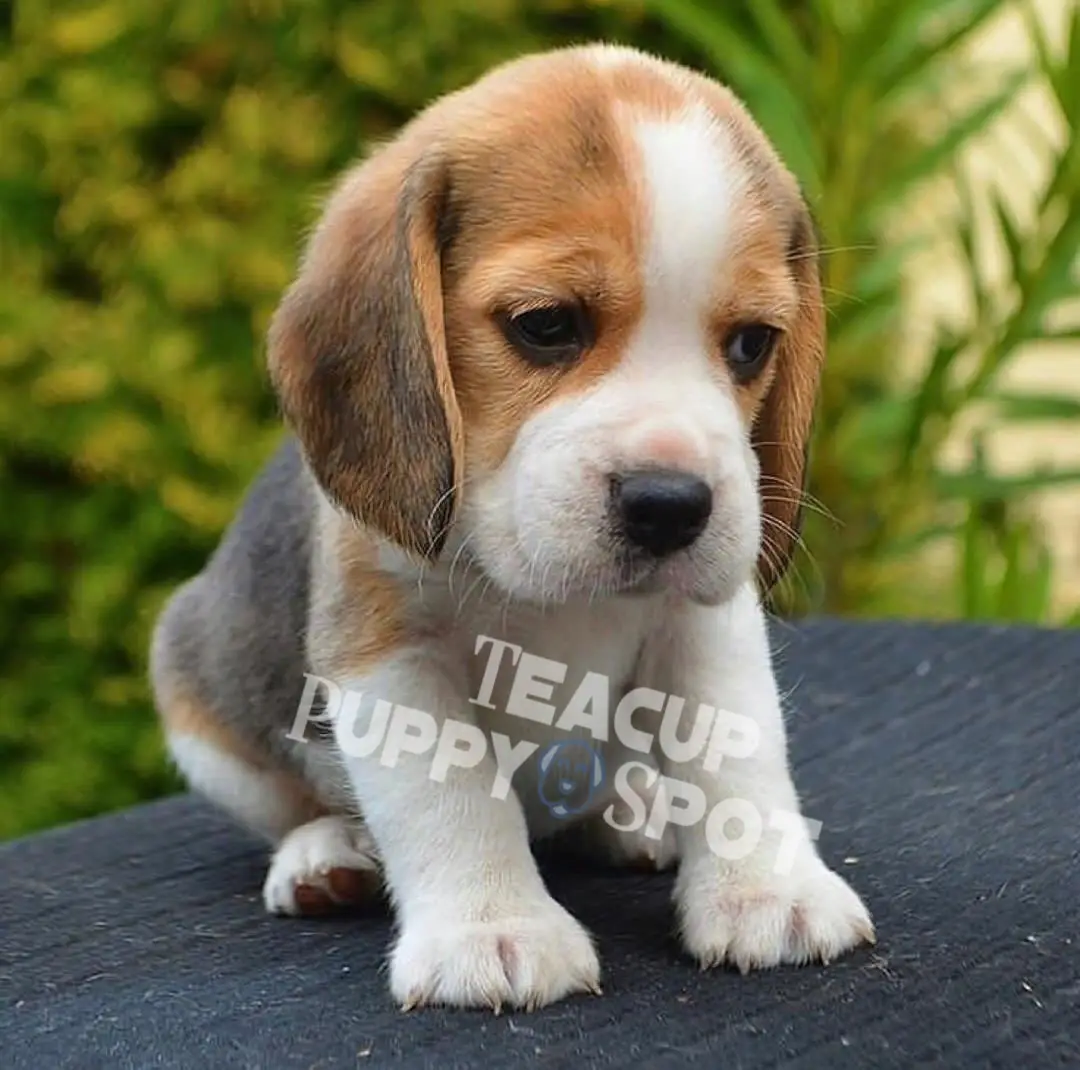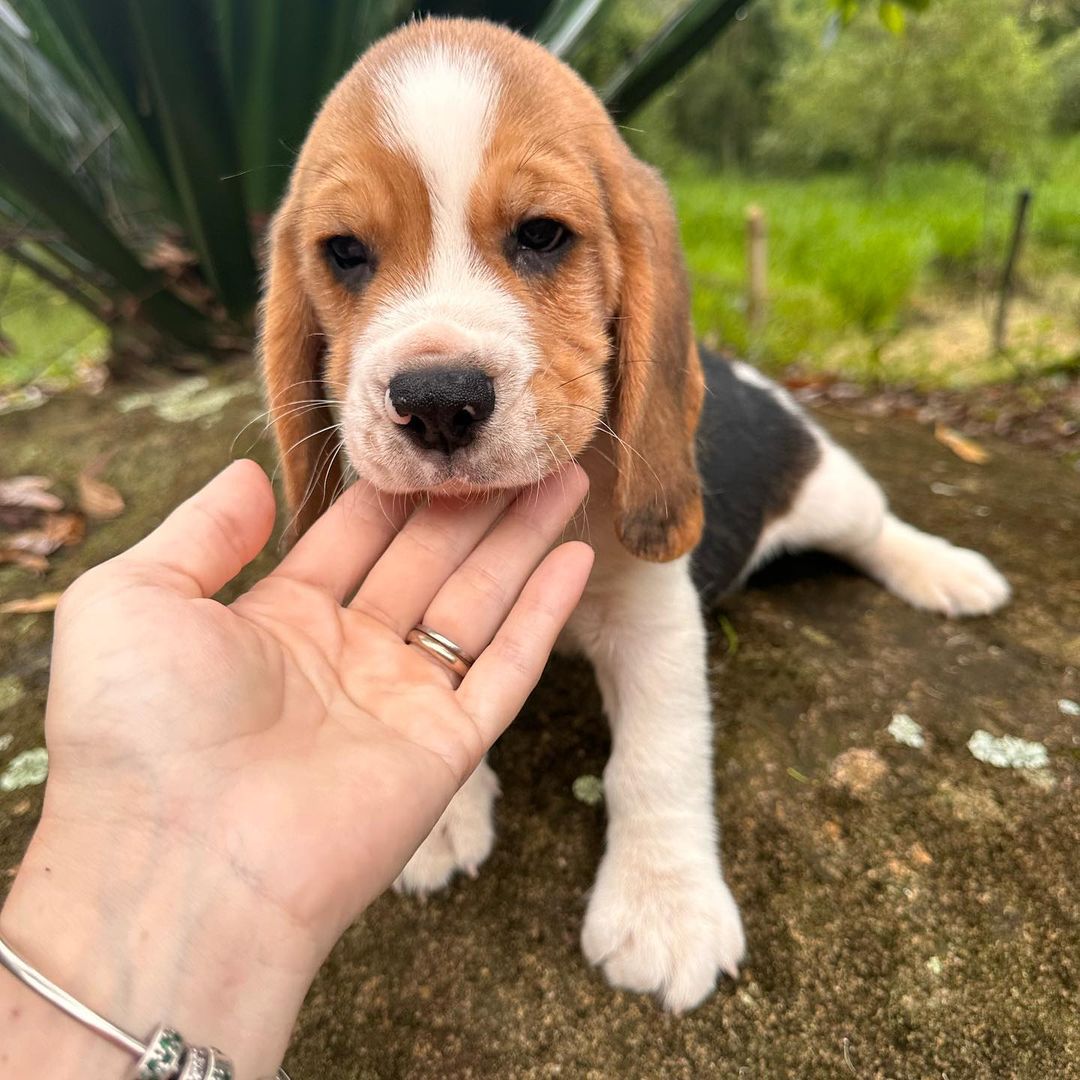Teacup Beagle Breed Information
About Teacup Beagle
Teacup Beagles are smaller versions of the Beagle dog breed. Because of their strong sense of smell, they are often used by the police, DEA, and airports to detect narcotics. Teacup Beagles are purebred and affectionate with their owners and families. Our available Teacup Beagle Puppies for sale are energetic and easy-going, making them great playmates. It’s important to note that there are smaller-sized Beagles, but there isn’t an officially recognized “teacup” variant.







Teacup Beagles are friendly and curious, making them great companions for families or individuals seeking an adaptable and affectionate pet. Their moderate activity levels and shedding might need attention, but their loyalty and friendly personality make them a great addition to households, especially those with children. Consider them if you're looking for a lively and affectionate smaller-sized dog.
Comprehensive Guide to Teacup Beagle Breed
Are you considering bringing home an adorable Teacup Beagle to your family? Look no further! At Teacup PuppySpot, we specialize in finding loving homes for Teacup Beagle puppies for sale from premium Beagle Breeders in the USA. Alongside Teacup Beagle, we offer various other breeds, ensuring each puppy is raised ethically and free from common genetic defects. Our commitment to responsible breeding and nurturing environments ensures these pups are ready to become cherished members of your family!
The Teacup Beagle for sale embodies all the remarkable traits of the Beagle breed in a smaller package, captivating dog enthusiasts with their charm and spirited nature. This comprehensive overview delves into the distinctive characteristics, care needs, temperament, and health considerations of these delightful and compact canines.
Origins and Breed Overview
Originating from England, Beagles were historically bred for their exceptional tracking abilities. Teacup Beagles, a smaller variant, were once favored by royalty for their hunting prowess. They typically weigh 7 to 15 pounds and stand around 7 to 12 inches tall at the shoulder, embodying all the Beagle’s traits in a more petite frame.
Teacup Beagle Quick Facts
Quick Facts | Details |
|---|---|
| Breed Names | Teacup Beagle, Pocket Beagle, Miniature Beagle |
| Height (inches) | Around 10 inches |
| Weight (pounds) | 15 to 20 pounds |
| Color | Various colors, often tri-colored |
| Lifespan | 10 to 15 years |
| Cost | $800 to $1,500 (varies based on breeder and location) |
Physical Characteristics
Teacup Beagles retain the distinctive characteristics of their larger counterparts, featuring a sturdy and well-proportioned build. Their short, dense coat comes in various colors, often showcasing the classic tricolor pattern of black, white, and tan. With their expressive eyes and floppy ears, they exude an irresistibly adorable appearance.
Temperament and Behavior
Renowned for their friendly and sociable nature, Teacup Beagles possess a gentle and affectionate demeanor. They thrive on companionship and enjoy being part of a family. Their lively disposition and playful antics make them wonderful companions for individuals and families.
Training and Exercise
Teacup Beagles are intelligent and eager to please, making them responsive to training. Early socialization and positive reinforcement methods contribute to their well-rounded behavior. They have moderate exercise needs, benefitting from daily walks and interactive play sessions to stimulate their minds and keep them physically active.
Nutritional Needs
A well-balanced diet tailored to their size, age, and activity level is essential for the health and vitality of Teacup Beagles. High-quality dog food that meets their nutritional requirements supports their overall well-being. Careful portion control helps maintain a healthy weight to prevent obesity-related health issues.
Grooming Requirements
Maintaining the Teacup Beagle’s coat involves regular brushing to manage shedding and keep their coat looking neat. Additionally, routine dental care, nail trimming, and ear cleaning contribute to their overall hygiene and health.
Health Considerations
While generally robust, Teacup Beagles may be prone to specific health issues such as hip dysplasia, epilepsy, intervertebral disc disease (IVDD), and eye conditions. Regular veterinary check-ups, a balanced diet, exercise, and preventive care aid in maintaining their health and addressing potential concerns.
The Teacup Beagle epitomizes the beautiful characteristics of the Beagle breed in a smaller size, offering companionship, affection, and playful energy to those who welcome them into their homes. Understanding their unique needs and providing them with proper care, love, and attention ensures a fulfilling and joyful companionship with these endearing and spirited canines.
Teacup Beagles, known for their smaller size than standard Beagles, often exhibit similar temperamental traits. Here are some common characteristics of Teacup Beagles’ temperament:
- Friendly and Sociable: Teacup Beagles tend to be pleasant, social, and affectionate dogs. They often enjoy the company of people and other pets, making them good family companions.
- Playful and Energetic: Like their larger counterparts, Teacup Beagles are active and energetic. They are playful and enjoy various activities, including games and exercise.
- Curious and Nose-Driven: Beagles, including Teacup Beagles, are known for their exceptional sense of smell. They are naturally curious dogs and may follow scents or investigate interesting smells, which can lead to wandering if not adequately trained or contained.
- Intelligent but Independent: Beagles are intelligent dogs but can also have a streak of independence. Their stubborn side makes training challenging, especially with distractions due to their scenting solid instincts.
- Vocal: Beagles are known for their distinctive baying howl or bark, often when they’re excited or stimulated by scents. This trait can be something to consider if you’re sensitive to noise or live in close quarters.
- Adaptable: Teacup Beagles can adapt well to different living environments, including apartments, provided they receive enough exercise and mental stimulation. However, they do require regular physical activity to stay healthy and happy.
- Affectionate with Family: They often form strong bonds and enjoy spending time with their family members. They can be loving and loyal companions.
- Hunting Instincts: Beagles are natural hunters, and they love to chase scents they pick up in the air. So, if you have a beagle, expect him to follow his nose a lot when you’re outdoors.
As with any breed, early socialization, consistent training, and plenty of exercise are essential for Teacup Beagles. Providing mental stimulation through interactive toys and activities can also help channel their energy and prevent boredom. Understanding and accommodating their hunting instincts while ensuring proper containment is crucial for their safety.
Teacup Beagles, like standard Beagles, are generally healthy dogs. However, they can be prone to specific health issues that are common in the breed. Here are some health considerations to be aware of:
- Obesity: Beagles tend to overeat and gain weight, leading to obesity. It is essential to monitor their diet and provide adequate exercise to prevent weight-related health problems.
- Ear Infections: Beagles have long, floppy ears that can trap moisture, leading to ear infections. Regular ear cleaning and inspection are necessary to prevent infections.
- Eye Problems: Some Beagles may be prone to certain eye conditions such as glaucoma, cherry eye, or progressive retinal atrophy (PRA). Regular eye check-ups by a veterinarian can help detect and manage these issues.
- Hip Dysplasia: While not as common as in some larger breeds, hip dysplasia can occur in Beagles. It’s a condition where the hip joint doesn’t fit properly, leading to arthritis or lameness. Responsible breeding practices can help reduce the risk of hip dysplasia.
- Intervertebral Disc Disease (IVDD): This spinal condition is more prevalent in dogs with longer backs, like Dachshunds, but can also occur in Beagles. It’s characterized by herniated discs, leading to pain or paralysis.
- Hypothyroidism: Beagles can be susceptible to thyroid issues, particularly hypothyroidism. Symptoms include weight gain, lethargy, and skin problems. Regular check-ups can help diagnose and manage this condition.
- Patellar Luxation: This condition involves the dislocation of the kneecap and is more common in smaller breeds. Regular veterinary check-ups can help detect this issue early.
Regular visits to the vet for check-ups are essential to keep Teacup Beagles healthy. Providing them with a nutritious diet, regular exercise, and a safe environment is also necessary. Responsible breeding practices can help prevent hereditary health issues. To achieve this, obtaining a puppy from reputable breeders who conduct health screenings is recommended. Early detection and prompt veterinary care are essential in managing any health concerns that may arise.
Teacup Beagles typically have a short, dense, and weather-resistant coat that requires moderate grooming. Here are some pointers for caring for their skin:
- Coat Type: The coat of a Teacup Beagle is short, dense, and usually close to the body. It’s a double coat, with a soft undercoat and a coarser outer coat.
- Grooming: Teacup Beagles require regular brushing to remove loose hair, dirt, and debris. You can use a soft-bristle brush or a grooming mitt for this purpose. Brushing a few times a week is usually sufficient to maintain the health of their coat.
- Bathing: Bathing should be done occasionally, when necessary, using a mild dog shampoo. Be cautious not to over-bathe as it can strip their coat of natural oils, leading to dry skin issues.
- Ear Care: Teacup Beagles are prone to ear infections due to their floppy ears. Regular ear checks and cleanings are essential. Use a veterinarian-recommended ear cleaner and gently wipe the ears to prevent wax buildup and moisture accumulation.
- Nail Trimming: Regularly trim their nails to prevent overgrowth, which can cause discomfort or affect their gait. Clip their nails carefully, avoiding the quick (the blood vessel inside the nail).
- Seasonal Changes: Be mindful of seasonal changes, as Beagles may shed more during certain times of the year, typically during spring and fall. Increased brushing during shedding seasons can help manage loose hair.
- Skin Care: Look for skin issues such as dryness, redness, or irritation. If you notice abnormalities, consult a veterinarian for proper diagnosis and treatment.
- Dental Care: Dental hygiene is essential for Beagles. Regular brushing or using dental chews can help prevent dental issues.
Individual dogs may have slightly different coat characteristics, so adjusting grooming routines based on your Teacup Beagle’s coat condition and needs is essential. Additionally, a balanced diet and regular exercise contribute to healthy skin and coat. Regular veterinary check-ups can also help identify skin or coat-related concerns early on.




 Rascal
Rascal $750
$750 Male
Male 11 Weeks
11 Weeks 

 Female
Female